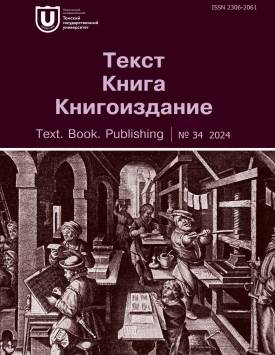Types of addressing in Gavrila Derzhavin’s lyrical discourse
The article deals with the specifics of communicative strategies and dialogical intentions of Derzhavin the lyricist. In the context of this scientific problem, the author of the article identifies five types of addressing (sacred, political, ideological, friendly, erotic), which determine the genre, intonation and thematic conditionality of Derzhavin's lyrical utterance and establish the nature of the relationship between the subject of speech and its addressee. Sacred addressing in Derzhavin's lyrics is carried out in the speech situation of the dialogue of the lyrical subject with the Creator, who acts as an invisible, but quite tangible Interlocutor, embodied in his creation. The subjective activity of Derzhavin's lyrical utterance is stimulated by the feeling of direct involvement in the active subjectivity of the Divine Addressee, the comprehension of whose essence opens up the possibility for the lyrical subject to comprehend himself. Political addressing is actualized in situations where Derzhavin's lyrical hero addresses royal persons and statesmen. Formally, this type of addressing fits into the odic genre tradition and serves as a means of poetic declaration of the author's civic position. However, in Derzhavin, this stable rhetorical model takes on the character of personally engaged communication, which implies a high degree of intimacy in the relationship between the sender and the addressee, which is especially pronounced in poems dedicated to Catherine II. Ideological addressing is practised by Derzhavin in those cases when the poet pursues the goal of a public discussion of issues of ethical, epistemological or aesthetic content. From the point of view of referential attitudes, a communicative strategy of this kind of addressing can be polemical, declarative (manifestation) or heuristic. Friendly addressing is mainly inherent in poems written in the genre of a friendly message. In lyrical works of this type, along with the main subject of speech, another subject-object instance (addressee) often appears, as a result of which a situation of value plurality arises, in the dialectical unity of which the author's value position is determined. Poems containing erotic addressing are purely monologue in terms of the structure of speech constructions and masked in terms of the nature of subjectivity. This type of addressing develops from the expression of rhetorically conditional forms of love experience, oriented to the tradition of Alexander Sumarokov's poetic school, to personally engaged subjective statements, often marked by features of the author's selfirony. The presented typology of addressing in Derzhavin's lyrics demonstrates a wide range of communicative strategies of the poet, striving to establish a truly dialogic relationship with his reader. The author declares no conflicts of interests.
Keywords
lyrical subjectivity, addressing, speech dialogism, communicative strategy, lyrical discourse, Gavrila Derzhavin, Russian lyrical poetryAuthors
| Name | Organization | |
| Larkovich Dmitry V. | Surgut State Pedagogical University | dvl10@yandex.ru |
References

Types of addressing in Gavrila Derzhavin’s lyrical discourse | Tekst. Kniga. Knigoizdanie - Text. Book. Publishing. 2024. № 34. DOI: 10.17223/23062061/34/2
